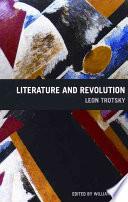Quotes from book
Literature and Revolution

Literature and Revolution is a classic work of literary criticism from the Marxist standpoint written by Leon Trotsky in 1924. By discussing the various literary trends that were around in Russia between the revolutions of 1905 and 1917 Trotsky analyzed the concrete forces in society, both progressive as well as reactionary, that helped shape the consciousness of writers at the time.

Literature and Revolution (1924), edited by William Keach (2005), Ch. 4 : Futurism, p. 120
Variants:
Art is not a mirror to hold up to society, but a hammer with which to shape it.
Remarks apparently derived from Trotsky's observations, or those he implies preceded his own, this is attributed to Bertolt Brecht in Paulo Freire : A Critical Encounter (1993) by Peter McLaren and Peter Leonard, p. 80, and to Vladimir Mayakovsky in The Political Psyche (1993) by Andrew Samuels, p. 9
Art is not a mirror held up to society, but a hammer with which to shape it.
Context: Art, it is said, is not a mirror, but a hammer: it does not reflect, it shapes. But at present even the handling of a hammer is taught with the help of a mirror, a sensitive film that records all the movements. Photography and motion-picture photography, owing to their passive accuracy of depiction, are becoming important educational instruments in the field of labor. If one cannot get along without a mirror, even in shaving oneself, how can one reconstruct oneself or one's life, without seeing oneself in the "mirror" of literature? Of course no one speaks about an exact mirror. No one even thinks of asking the new literature to have mirror-like impassivity. The deeper literature is, and the more it is imbued with the desire to shape life, the more significantly and dynamically it will be able to "picture" life.